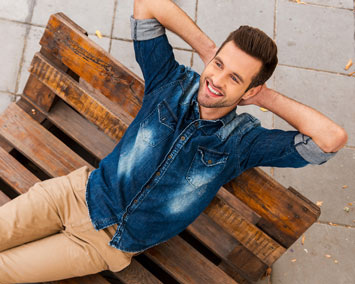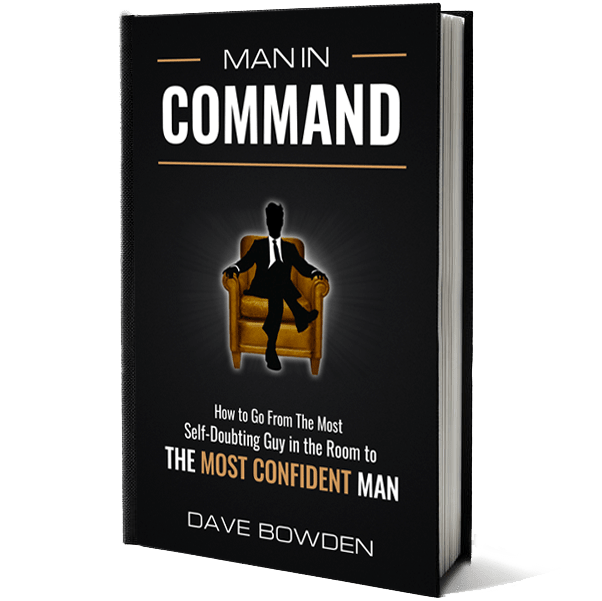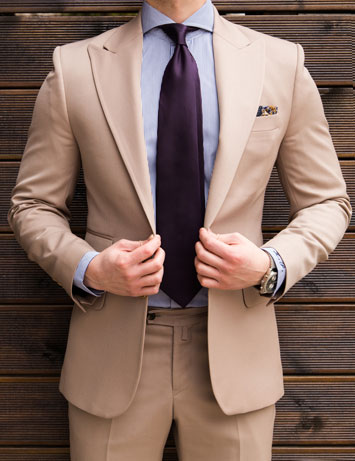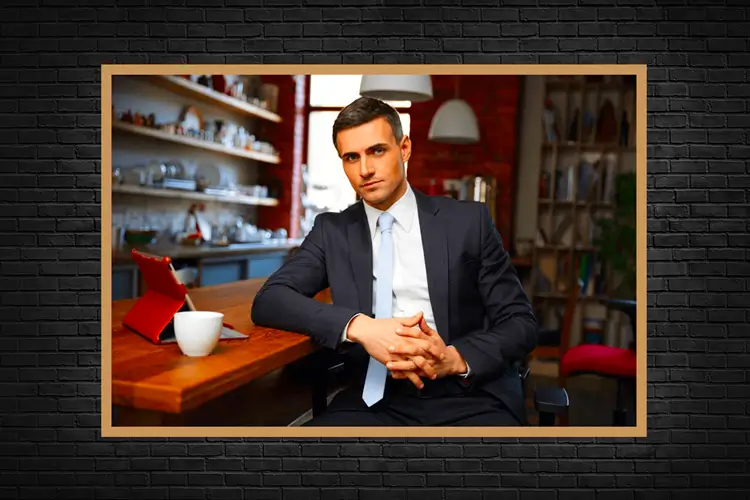You’ve probably noticed that some guys just seem to exude confidence.
The problem is that, while it’s obvious that men who convey true confidence stand out from the crowd, it’s not always obvious what “conveying confidence” even means.
Just what are the signs of a confident person? And more to the point, what characteristics or traits do you need to develop in order to become one yourself?

It took me more than a few years to find answers to those questions.
At first I thought it would require years of careful study and the obtainment of a phD in human nature.
But at the end of the day, it was more straight forward (and much faster) than that.
By observing all the good qualities that self-assured men and other confident individuals seem to share, I was able to home in on both the big and little things that I needed to do—not just to make a good impression on people, but become the kind of self-assured and truly confident man I wanted to be.
And you can do the same.
Whether you’re a guy wondering how to project confidence when speaking to a beautiful woman, or a woman wondering how to tell if a guy you like is confident, below you’ll find dozens of traits of highly confident men that separate a confident leader from an insecure man.
Check out the list and ask yourself which of these confident characteristics you already have, and which ones you need to develop in order to become the best version of yourself.
And (shameless plug alert!) if you’re looking for a more comprehensive roadmap for confidence, my book Man in Command: How to Go From the Most Self-Doubting Guy in the Room to The Most Confident Man.
- The Surest Signs of a Confident Man
- Stop Doubting. Start Dominating.
- Takes Pride in His Accomplishments
- Remains Humble
- Doesn’t Put on Airs
- Listens Well
- Is Assertive, But Not Aggressive
- Stands Up For Himself and Others
- Is Easy Going
- Has an Open Mind
- Has A Great Sense of Humor
- Looks Put Together
- Expresses Gratitude
- Doesn’t Take Criticism Personally
- Behaves Like a Gentleman
- Displays Leadership
- Steps Outside His Comfort Zone
- Lives Proactively
- Compliments Others
- Values Honesty
- Knows His Strengths and Weaknesses
- Learns Continuously
- Apologizes Easily
- Makes Decisions
- Values Relationships
- Invests in Himself
- Exercises Regularly
- Eats Healthy Foods
- Overcomes Over-Thinking
- Embraces Vulnerability
- Practices Patience
- Maintains Consistency
- Exhibits Flexibility
- Displays Empathy
- Commits to Personal Growth
- Shows Authenticity
- Demonstrates Graciousness in Defeat
- Exudes Optimism
- Fosters Strong Connections
- Respects Boundaries
- Manages Emotions Effectively
- Inspires Others
The Surest Signs of a Confident Man
What does the confident man do differently? Well, he…
Thinks Abundantly

Confident people have what Stephen Covey, author of The 7 Habits of Highly Effective People, called an “abundance mindset.”
They don’t think in zero-sum terms, but instead look for win-win solutions that bolster everyone.
Gives Generously
Following from their abundance mindset, people with confidence put the needs of others above their own needs and wants—they give first, and take second.
And this doesn’t always mean monetary giving either; they give their time, energy and attention without expecting anything in return.
Projects Power
In Olivia Fox Cabane’s excellent book The Charisma Myth, she explains that there are three different things that contribute to a person’s charisma, which is closely related to confidence.
The first is power. As Fox Cabane writes, “When you meet a charismatic person, you get the impression that they have a lot of power and they like you a lot.”
Power doesn’t necessarily mean physical strength, although that certainly helps. It can also mean situational power.
For instance, the CEO of a company has climbed the corporate ladder and amassed a lot of power, even if they’re physically diminutive.
Whether its physical or situational, the confident man knows he has power, and knows others can sense it.
Possesses Presence
The second of Fox Cabane’s three elements of charisma is presence.
Presence is the foundation upon which charisma – and quite often, confidence – is built. To have presence is to make an impact in any room that you’re in, regardless of how extroverted or outgoing you are.
For instance, Fox Cabane points out that people who meet the Dalia Lama, a fairly quite and introverted man, are often impressed by his presence.
But they say the same thing about Bill Clinton, a famously extroverted charmer.
Whether his presence his quiet or loud, a confident man is comfortable in his own skin, and others can sense it.
Conveys Warmth
The final of the three components that make up charisma is warmth.
This is one that you might not immediately associate with confidence, but it’s crucial. Insecure people who lack confidence often take it out on others by being petty, rude or dismissive.
Confident and charismatic people, on the other hand, have a generosity of spirit. It goes back to the point above about thinking abundantly:
When you feel like you have all the security and self-esteem that you need, you don’t mind doling out warmth to others, so that they can feel the same.
Is Kind
Confidence and kindness go hand in hand.
When you possess power, presence and warmth in equal measure, you have no fear that your kindness will be misconstrued as weakness – and no qualms about treating other people well.
Speaks Well
Confident men aren’t necessarily the most talkative – you don’t have to be a gregarious extrovert to be confident.
But when they do speak, they’re able to express their ideas clearly.
Carries Himself Well

Confident guys and other successful people convey their self-esteem not just through the way they communicate with words, but through their body language.
They stand up straight and maintain good posture, and convey openness by keeping their arms in front of them, rather than crossed and closed off.
Makes Strong Eye Contact
There’s something personal, almost intimate, about looking into someone’s eyes.
Secure men don’t shy away from it; instead, they make direct eye contact, meet people’s gaze, and feel comfortable holding it.
Smiles Freely
Insecure guys sometimes think they have to scowl and look brooding in order to convey strength.
Confident guys recognize the benefits of smiling and never hesitate to express optimism and joy.
Stop Doubting. Start Dominating.
Take Command of Your Confidence with a Step-by-Step Guide to Building Strong Self-Esteem

Are you sick of feeling like you’re not living up to your full potential?
Do you find yourself wondering how to be more confident with girls, or searching for ways to build confidence at work?
Have you ever seen a confident man who was fit, well dressed, charismatic and self-assured, and wondered how you can compete?
The Amazon #1 bestselling book Man in Command is your roadmap for overcoming your introversion, subjugating your shyness and developing deep, authentic confidence in yourself.
Takes Pride in His Accomplishments

Contrary to what societal norms might have you believe, possessing a lot of confidence doesn’t mean you have to be arrogant.
Confident men don’t waste time bragging about petty shit like an expensive car or a promotion at work, but they don’t shy away from acknowledging their achievements, either.
Remains Humble
Yes, it’s possible to be both proud of your accomplishments and humble at the same time.
Confident guys are proud, but also secure enough that they don’t have to boast about every little thing they’ve ever done.
Doesn’t Put on Airs
Part of being confident means being comfortable in your own skin, flaws and all.
As a result, confident guys don’t pretend to be something they’re not – and definitely don’t pretend to be more hautier, more cultured or more sophisticated than anyone else.
Listens Well
One distinct advantage of being secure enough to not talk about yourself all the time is that it frees you up to listen.
Confident guys engage in active listening. Rather than just waiting for the other person to stop talking os they can make their next point, truly confident people genuinely listen to what others have to say, and make them feel acknowledged.
Is Assertive, But Not Aggressive
Insecure guys will often try to mask their insecurity with bravado, which sometimes results in needless aggression.
Confident men stand up for what they think is right, but do it in a diplomatic way.
Stands Up For Himself and Others
In addition to standing up for their principles, confident guys stand up for their people.
This manifests itself in ways both large and small, from protecting people in a physical altercation to defending their friend’s reputations when others disparage them.
Is Easy Going
Confident guys are comfortable enough in themselves that they don’t get too riled up; instead, they’re able to let things slide and waste little time sweating the small stuff.
Has an Open Mind
Confident guys are able to entertain new ideas without becoming defensive or territorial, which opens them up to a wide variety of possibilities and experiences.
Has A Great Sense of Humor
Having a good sense of humor doesn’t mean you’re going to get up on stage and improv a 10-minute stand up set.
But because confident guys are easy going, they’re able to laugh at life’s many absurdities – and laugh off things that lesser men might perceive as slights.
Looks Put Together

Even if they don’t exactly look like George Clooney on the red carpet, confident guys know that when you look good, you feel good.
That’s why they invest enough time to present themselves well and do what they can to look as handsome, attractive and polished as possible.
Expresses Gratitude
Confident guys recognize what they have and actively express gratitude for it.
Doesn’t Take Criticism Personally
Confident guys are able to recognize criticism for what it is: feedback.
Sometimes it’s valid, sometimes it’s not, but confident guys realize that it’s never a personal indictment.
Behaves Like a Gentleman
The more confident you are, the more likely you are to practice proper etiquette.
Confident guys hold doors, display patience and otherwise behave like a gentleman.
Displays Leadership
It’s definitely possible to be confident without being a leader – but it’s impossible to be a leader without being confident.
Setting a strong example for others is a sure sign of confidence.
Steps Outside His Comfort Zone
Confidence allows you to be more comfortable with discomfort.
Confident guys embrace self-improvement, and recognize that the only way to grow is to try new things and step outside their comfort zone every once in awhile.
Lives Proactively
Confident guys embrace another of Covey’s seven habits: they take action.
Confidence and action have a reciprocal relationship: the more confident you feel, the more prone you are to taking action, and the more you take action, the better you feel about yourself – and the more confidence you build.
Compliments Others
The confident guy follows the advice Dale Carnegie laid out in How to Win Friends & Influence People some 80 years ago, which is as true today as it was then:
“Be hearty in your approbation and lavish in your praise.”
The confident man compliments others frequently and prides himself on making others feel good.
Values Honesty
Confidence gives you the strength to express yourself honestly and resist the urge to try to hide who you are.
As a result, confident guys are honest both with themselves and with others.
Knows His Strengths and Weaknesses
Because their honest with themselves, confident guys are able to recognize their own strengths and weaknesses, which allows them to identify areas where they need to improve.
Learns Continuously

Confident guys remember the words of Socrates:
“All I know is that I know nothing.”
(Like I said: they’re pretty humble.)
They perpetually seek out new knowledge in order to continue learning and growing.
Apologizes Easily
When you’re insecure you’re often defensive, which can prevent you from admitting when you’ve done something wrong.
Confident guys know they’re not perfect and have an easier time acknowledging when they’ve made a mistake.
And because they’re proactive, they’re also quicker to set about fixing it.
Makes Decisions
When you’re unsure of yourself, you tend to agonize over every little decision.
Confident guys make a call, because they know that if they’re wrong they have the strength of character to own up to it and correct it without feeling embarrassed.
Values Relationships
Human beings are social creatures, which means that real power – and real confidence – comes not from any one individual, but from groups working in harmony toward shared goals.
Despite what pop culture would have you believe, the most confident man is not the lone wolf who always goes it alone.
The real power belongs to those who know how to build a coalition, and amass an army of friends and allies.
Invests in Himself
Just as the confident man invests in relationships with others, he also invests in himself and his own betterment.
That means he invests the time, energy and money it takes to ensure that his mind, spirit and body (on which more below) are constantly growing, evolving and improving.
Exercises Regularly
You don’t need to have a physique like Chris Hemsworth to be confident, but you absolutely need enough physical health, energy and stamina to achieve your goals and put the other traits of a confident man listed here into practice.
The best way to do that is through regular exercise in which you push yourself to your physical limits, then give yourself enough time and fuel to recover properly.
And speaking of fuel…
Eats Healthy Foods
Just as BMWs only run on premium gas, a man can only operate at the peak of his potential if he’s fueling his body with healthy, hearty foods.
New fad diets come and go ever year, but the fundamentals of eating clean couldn’t be easier:
Eat a lot of fruits and vegetables, keep your protein sources lean, cut way down on empty carbs, and avoid sugar as much as you possibly can.
Again, a confident man doesn’t have to be a gym rat or a health nut, but he does have to be healthy enough to get sh*t done – and for that, you need a clean diet.
Overcomes Over-Thinking
Confident guys are just as prone to negative thoughts and self-doubt as anyone else.
The difference is that they do what they have to in order to overcome these hurdles, and don’t let themselves get bogged down.
The good news is that keeping negative thoughts at bay and cultivating a confident mindset is actually pretty straightforward.
To find out how to do it, enter your email address below and I’ll send my proven, four-step process for overcoming negativity straight to your inbox.
Embraces Vulnerability
Confident guys understand that being open about weaknesses or fears is a strength, not a liability. Their ability to embrace vulnerability comes from a strong sense of self-worth and high self-esteem, not from a place of low self-esteem.
Practices Patience
A man who’s comfortable and confident in his own skin is one who’s able to maintain his composure and show restraint in challenging situations, understanding that some things take time. This patience is a fine line that differentiates a genuinely confident man from an insecure one.
Maintains Consistency
Best-selling business author Simon Sinek has a quote about success that applies just as well to confidence: “It’s not about intensity—it’s about consistency.”
Confident men demonstrate reliability in their actions and behaviors, building trust and respect. They pay close attention to the small things, understanding that consistency is a key trait of a confident man.
Exhibits Flexibility
One major sign of confidence is the ability to adapt on the fly. Circumstances change, and showing resilience and openness to new experiences also demonstrates confidence.
This flexibility is often evident in social situations, where confident men are comfortable spending time with different types of people.
Displays Empathy
A confident man understands and respects the emotions and perspectives of others. He actively listens, showing genuine interest and concern. His empathy often leads to strong relationships, as he can relate to others’ situations and offer support or guidance from a place of understanding.
Commits to Personal Growth
He views personal development as an ongoing journey, not a destination. He’s open to learning new skills, embracing change, and reflecting on his experiences to evolve continually.
This commitment to growth ensures he remains adaptable and relevant in both personal and professional spheres. He understands that personal growth often requires hard work and a conscious effort, but it’s a good thing that contributes to his overall positive impact.
Shows Authenticity
Staying true to his values and beliefs, a confident man is not easily swayed by societal pressures or fleeting trends.
He knows his worth and maintains his integrity, leading to a life that is aligned with his true self, which in turn builds genuine self-respect and respect from others. His clear vision and confident attitude set him apart as the best person he can be.
Demonstrates Graciousness in Defeat
He accepts failures and setbacks as part of life’s learning process. Instead of harboring resentment or bitterness, he analyzes what went wrong, learns from it, and moves forward with grace.
This ability to handle defeat shows maturity and resilience. A genuinely confident man knows the right time to step back and reassess, ensuring the end result is always in line with his own abilities and vision.
Exudes Optimism
In the face of challenges, a confidnet man maintains a positive outlook by seeing opportunities for growth and learning.
He tackles difficult tasks with a smile, knowing that at the end of the day, a positive attitude goes a long way.
And his optimistic mindset is contagious, uplifting those around him and helping them have more faith in their own ability to overcome obstacles with a constructive and hopeful mindset.
Fosters Strong Connections
Understanding the value of relationships, a confident man invests time and energy in building and nurturing meaningful connections, whether they’re with a friend, a colleague or a romantic partner.
He knows that a strong support network is crucial for both personal happiness and professional success. He respects boundaries, ensuring that his relationships are healthy and mutually beneficial.
Respects Boundaries
He recognizes and respects the personal and professional boundaries of himself and others. This understanding leads to healthy relationships and work environments, as it promotes mutual respect and minimizes conflicts.
His good manners and communication skills make him a good listener and a respected figure in both personal and professional settings.
Manages Emotions Effectively
Instead of reacting impulsively, he thoughtfully responds to situations, demonstrating emotional intelligence.
This control over his emotions helps him navigate complex situations calmly and make decisions that are not clouded by temporary emotional states.
His ability to manage emotions effectively is a direct reflection of his own confidence and mental state.
Inspires Others
Through his actions, attitudes, and approach to life, he serves as a role model, encouraging and motivating those around him.
His leadership style is not about wielding power, but about empowering others to reach their full potential. He takes a little bit of time each day to inspire and be inspired, knowing that it’s these moments that make a big deal in the long run.
More Resources ↓
More Advice on Building Confidence & Self Esteem from Irreverent Gent:
- 99 Awesome & Inspiring Confidence Quotes for Men
- The 8 Best Things Guys Can Do to Build Self-Confidence
- 7 Self-Confidence Tips Guys Need to Know – and 7 Myths to Stop Believing
- In-Depth Onnit Alpha Brain Review
- The Challenges & (Many) Benefits of The NoFap Timeline
- Answering Some Common Questions on Self-Confidence
- 9 Fundamental Pieces of First Date Advice to Help You Get Over Your Nerves
- 100+ Awesome & Inspiring Self Confidence Quotes for Men




Great post. I’ve definitely found myself wondering what “it” is that confident guys have, and especially how confidence is different than arrogance. Thanks for sharing your insight.
You’re welcome Aaron! I know what you mean – the difference between confidence and arrogance is something I spent a long time pondering as well. It’s not always obvious, but they are definitely distinct.
Same here. For years I mistook confidence for arrogance.